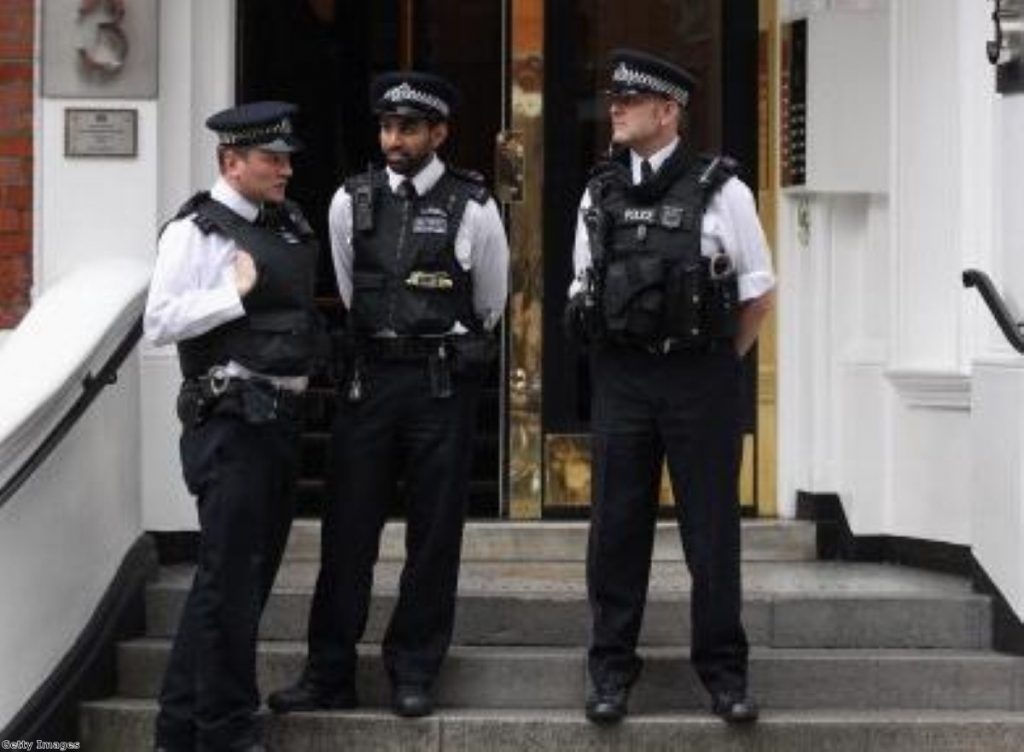Analysis: Ecuador embassy row shows bullying and diplomacy just don’t mix
Britain has a long history of blunt, bullying diplomacy. The Assange standoff at the Ecuadorian embassy suggests that things haven't changed much since a century or more ago, when our preferred method of resolving a diplomatic dispute was to send in a gunboat or two.
Just south of Knightsbridge tube station in central London, close to the Albert Hall, a Harrod's and in the midst of some of Britain's most expensive real estate, there nestles a small slice of South America. Like every other embassy, flat 3B in Hans Crescent, London is not legally a part of Britain. Here the government of Ecuador is sovereign.
For the past 57 days it has also been the sanctuary of Julian Assange, the Wikileaks founder wanted by the Swedish government for questioning over alleged sexual offences. Britain has committed to extraditing the 41-year-old, but – because of the inviolable embassy principle – has not been able to touch him.
Now that may be about to change. Halfway across the world, in the Ecuadorian capital of Quito earlier this week, a British embassy official handed over a letter threatening that the principle of diplomatic immunity could be scrapped on a whim. British police officers could enter the embassy and seize Assange, the UK suggested in the letter, entirely reasonably and legally. Ecuador is "deeply shocked".


The legal status of the UK's claim is spurious. In 1987 parliament passed the Diplomatic and Consular Premises Act, empowering the government to revoke the status of any embassy if it isn't used "for the purpose of its mission or exclusively for the purposes of a consular post". That followed the 1984 Libyan embassy siege, which ended with those inside the building being allowed to leave the building after opening fire on a peaceful demonstration outside – killing WPC Yvonne Fletcher and injuring 11 others. Britain had been obliged to break off diplomatic relations with Libya in their entirety. That was rather unsubtle, admittedly, so the government wanted the more nuanced option of revoking a building's diplomatic status, rather than reaching straight for the nuclear option of cutting off relations.
That legislation has not been tested until now. And it seems likely it is deeply flawed. The Act instructs the secretary of state to only give a green light for the revocation of status "if he is satisfied that to do so is permissible under international law". The key question is: when would it ever be permissible?
International law here means article 22 of the Convention of Vienna, signed in 1961. "The premises of the mission shall be inviolable," it declares. It is the responsibility of the host state "to protect the premises against any intrusion… or impairment of its dignity". Furthermore, "the premises of the mission, their furnishings and other property thereon and the means of transport of the mission shall be immune from search, requisition, attachment or execution".
Assange's defiance of the British authorities has been embarrassing for the UK government. It is not accustomed to this sort of treatment. And so, as so often when it is frustrated, officials have called up the lawyers and explored their options.
There are two possible scenarios here. In one, the Foreign Office is seeking to do all it can to secure Assange – and is prepared to use the legislation to break the deadlock. This would turn a minor issue into an extremely large one.
In the second scenario, it knows that the legislation could easily be challenged. That means its bid to put the Ecuadorians in possession of the "full facts" is an attempt to pressure the Ecuadorians into giving up. You can spin that how you like, but Britain's enemies in the world will call it one thing: bullying.
This could prove extremely damaging for the UK around the world. It opens up the possibility that awkward governments like those in Russia and China – and outright hostile ones like Iran – being more comfortable in moving against British embassies overseas. The UK has kicked up a huge fuss when its embassy in Tehran has come under pressure in the past, and rightly so. Could it expect similar levels of international support in a similar situation in the future? The Tehran embassy has been abandoned after being violated in November 2011, but other embassies around the world are now vulnerable.
All this calls into question the British approach to diplomacy. The Foreign Office maintains a robust line whichever political party is in government, but there has been a notable shift towards bluntness since the coalition took power. David Cameron's very undiplomatic comments about Pakistan on his India visit began a trend of 'plain speaking' only justified by the prime minister's penchant for directness and honesty. These are admirable traits in some situations, but not when dealing with sensitive international issues. The Falklands row has only reinforced the impression of a country which won't budge.
Now, after the extraordinary diplomatic boon of the Olympics, the UK has engineered out of nowhere an opportunity to ruin all its good work in a moment of rash decision-making. By making its threat to the Ecuadorian government, Britain has already made a decision it could regret for a long time.












